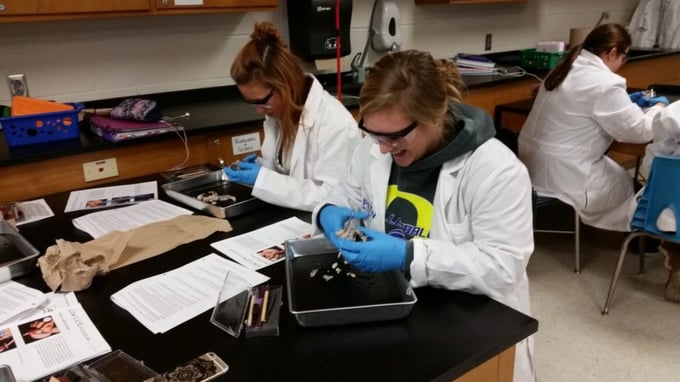Mrs. Dyan Biringer is K-12 science department chair and high school science department chair. Mrs. Biringer has a master's degree in mathematics education with an emphasis on technology. She teaches at Onsted High School in Onsted, Michigan.
When I first implemented Project Lead the Way’s Principles of Biomedical Science course two years ago, I knew the program would be a fun way for students to learn, but what I didn't know was how much it would influence the way I saw science education as a whole.
In the beginning, it was really hard not to just tell my students what they should know, but instead, allow them the freedom to discover key lessons through engaging activities. This approach was a shift not only for me as an instructor, but also for my students, as well. My students, like many others, really struggled with this concept at first, but once they were able to see the "why" in what they were doing instead of just the "what," it was engagement at its finest! This approach really showed me how these project- and problem-based learning experiences are so crucial to science education.
I have been able to implement many of these core ideas into my traditional biology courses, as well. This has provided my students a much different type of science course than they have traditionally been through. I think it has allowed students to begin to have that love for science and inquiry again – an excitement that so many have lost since their childhood.
So much of science education has turned into a list of concepts that students need to memorize. But Project Lead The Way has shown us that this is not what science needs to be. Science is about doing, and that is what happens in my courses. We solve problems, we apply concepts, and we figure out “why.” We do not just do a worksheet and try to memorize all the bold words.
One thing I love about this class, and other PLTW courses, is that it gives students a chance to solve problems and apply their knowledge to relevant concepts. Students are challenged regularly and understand why they need to know the information – and it is not just because their teacher told them they need to know it. This class is preparing them more for “doing” not just “knowing,” and that is why my students and I love this course and this program.
I think another important part of the program is the career exploration. I think many students sign up for the biomedical course because they think they want to go into one of the “common” healthcare fields – doctor, nurse, vet, or physical therapist. But these PLTW Biomedical Science courses allows students to see there are so many more medical careers out there, and they don’t all require 10 years of higher education, either. Students are able to see that these careers range from two-year certifications all the way up to medical degrees. I think this really helps to influence all levels of students to choose a medical field career – and to choose one that fits their needs the best. These courses do not discriminate to the “top 10” students only; they are a perfect fit for students of all levels.
PLTW’s blog is intended to serve as a forum for ideas and perspectives from across our network. The opinions expressed are those of this guest author.

